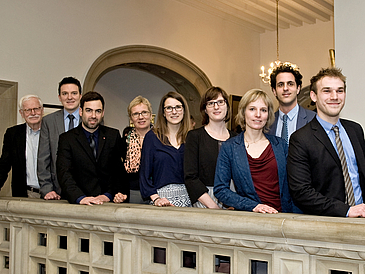Science plays an important role in Bremen: The Bremen Study Prize is intended as an added incentive for the young academics studying here. Some 100 guests were invited to the City Hall to witness presentation of the Bremen Study Prize 2014. A total of six University of Bremen graduates received the honor, which is awarded by the “unifreunde” association of friends of the University of Bremen and Jacobs University Bremen. This time the prize was awarded to four students for their outstanding Master and PhD dissertations, and there were two special prizes sponsored by the firm Bruker Daltonik GmbH and the Rotary Club Bremen-Roland for PhD dissertations in the area of science and engineering studies.
In his laudatory speech, the University of Bremen’s Vice Rector for Studies and Education, Professor Kurosch Rezwan, praised the prizewinners. His appreciation was shared by Professor Bengt Beutler (“unifreunde”) and Bremen’s Senator for Science, Eva Quante-Brandt, who commended the prizewinners for their personal and academic engagement, and the perseverance that reflects in their theses.
Science benefits everyone
Bremen is a university town in which research has always occupied a major place. Ten years ago it was Germany’s City of Science. The award of the Bremen Study Prize is an excellent example of how Bremen encourages aspiring students to produce outstanding academic work. The prizewinners’ theses are good examples of the importance of research in different areas of society. It is an ongoing challenge to disseminate the results of research and illustrate the advantages that accrue to society at large.
Quality – a main feature of Bremen’s Science Plan 2020
Eva Quante-Brandt stressed, “The pursuit of science and the search for knowledge that drives research are important attributes that students learn through university education – and this is reflected in their dissertations.” The policy implications are clear: Quality is one of the most important objectives of the Bremen Science Plan 2020, which aims at the advancement of young academics and ensuring that there will be more outstanding dissertations to come in future.
Winners of the Bremen Study Prize 2014 and the special prizes:
Doctoral dissertation in the category Natural Sciences and Engineering:
Dr. Hanna Lührs
Topic: The Influence of Boron on the Crystal Structure and Properties of Mullite
Master’s thesis in the category Natural Sciences and Engineering:
Georg Pesch
Topic: Simulation of Chemical Reaction Mechanisms in Highly Porous Films Using the Volume of Fluid Method
Doctoral dissertation in the category Social Sciences and the Humanities:
Dr. Andrea Schmeichel
Topic: The sustainability criteria for biofuels and bioliquids: imports into the EU
Master’s thesis in the category Social Sciences and the Humanities:
Hanna Grube
Topic: How Does Regular Consultation and Advice Impact on the Learning Outcome of High-school Students? – Qualitative Interviews During a School Experiment
Special prize for doctoral dissertations in the category Natural Sciences and Engineering sponsored by Bruker Daltonik:
Dr.-Ing. Mathias Soeken
Topic: Formal Specification Level
Special prize for doctoral dissertations in the category Natural Sciences and Engineering sponsored by the Rotary Club Bremen-Roland:
Dr.-Ing. Fabian Meder
Topic: Interactions of proteins, peptides, and viruses with surface functionalized colloidal alumina particles

